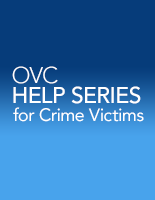Message from Director Hart Commemorating Domestic Violence Awareness Month
Every October, the Nation commemorates Domestic Violence Awareness Month. Jessica E. Hart, Director, Office for Victims of Crime, discusses the Office for Victims of Crime’s commitment to supporting organizations throughout the Nation that support victims of domestic violence.
See the YouTube Terms of Service and Google Privacy Policy



